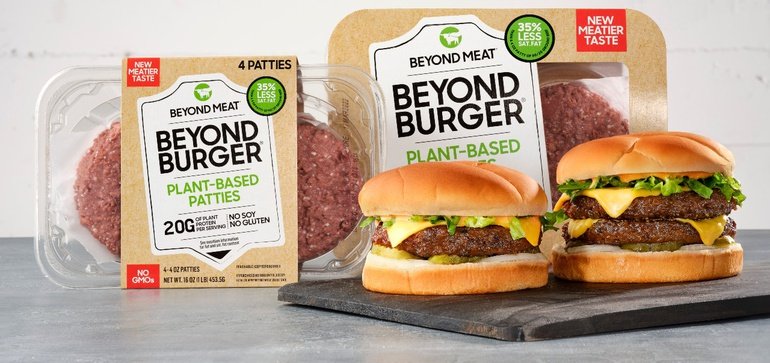Beyond Meat shares tumble after company reports lower-than-expected revenues

Dive Brief:
- Beyond Meat’s shares plunged about 18% in after-hours trading after the plant-based meat company reported lower-than-expected earnings on Wednesday evening. In the most recent quarter, Beyond Meat posted sales growth of 12.7%, ending the three months with $106.4 million in net revenues, but the company missed its earlier stated target of $120 million to $140 million, which it had warned about three weeks ago.
- In the earnings call, CEO Ethan Brown was matter-of-fact about the challenges that the company faced in the previous quarter. Labor shortages, supply chain disruptions and changes in expected consumer behavior due to the delta variant of the coronavirus impacted domestic growth, he said. But Brown also touted milestones in international expansions — especially in the European Union and China — and new innovations as highlights of the quarter.
- Plant-based meat was previously a category that only saw growth, but the last quarter has shown slowdowns for several top brands owned by publicly traded companies.
Dive Insight:
Since announcing that Beyond Meat would not meet its previously stated sales targets, Brown has been trying to convince investors not to panic. But judging from the steep drop in the company’s share price since it reported earnings, it does not appear he was successful.
“The headline for the third quarter, relative to our expectations at the onset of 2021, is that it was a difficult operating environment,” Brown said at the beginning of Wednesday’s earnings call.
And while Brown says there are a lot of good things on the way that will bring Beyond Meat back to the growth rates the company and investors have grown accustomed to, the company is still lowering its guidance for the current quarter to be in the range of $85 million to $110 million. That guidance, he said, was lowered to guard investors against other unexpected challenges and to forestall another round of last-minute panic on share prices.
So what happened? It’s not one simple thing, Brown explained on the call. As the delta variant of coronavirus took hold this summer, he said, foodservice suffered, impacting sales in that channel. But there was no corresponding increase in retail sales in the quarter either, Brown said, with consumers less interested in trying new things and eating healthier food, as well as making fewer trips to the grocery store. Labor shortages at Beyond Meat’s manufacturing facilities, driving fleet and its co-packers led to a drop in sales. And severe weather disrupted production at a Pennsylvania plant and destroyed a large amount of packaging materials.
But Brown said the future holds great promise. The company’s SPINS data shows that competition has not eaten away at Beyond Meat’s sales. The company has four of the six top-selling SKUs in plant-based meat, including the top one. Total distribution points have increased 23% from a year ago, and Beyond’s brand velocity is nearly three times higher than the category average, Brown said. Beyond Chicken Tenders, which launched in foodservice this summer and are beginning a retail rollout, also provide a huge growth opportunity for the future, he said.
Foodservice holds great potential for Beyond Meat as new products and agreements develop, Brown said. These include the long-awaited McPlant collaboration with McDonald’s, which is currently being tested in a few restaurants in the United States. And manufacturing plants and supply chains in other countries also will continue to help the company’s total growth.
“We’re really still doing what we set out to do, which is to lead this movement,” Brown said.
This quarter has been difficult for all brands in the plant-based sector, though it shows most acutely for Beyond Meat because meat alternatives is its only business. Maple Leaf Foods — which owns Field Roast, Lightlife and Chao under its Greenleaf Foods division — announced last week it is reviewing its plant-based brands following year-over-year sales declines for the last two quarters. CEO Michael McCain demurred when directly asked on the earnings call if it could lead to a sale or new strategic partnership. However, he said, the 2017 acquisitions of the brands that created Greenleaf Foods were rooted in projections of a 30% growth rate.
Kellogg, which owns legacy plant-based brand MorningStar Farms, also reported a decline in brand sales during the previous quarter. The company did not quantify the decline, but CEO Steven Cahillane said in the earnings call there is still a lot of enthusiasm and excitement for the category and he sees more growth in 2022.
Source: fooddive.com

